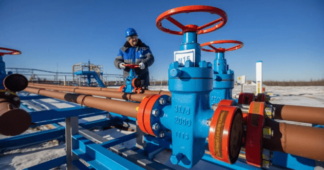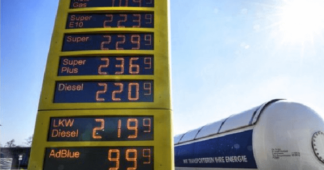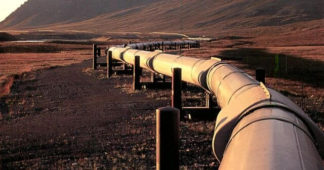Burn time: The case for a new European energy union
Almost all EU member states are exposed to the fallout for the energy market of Western sanctions on Russia. To protect their energy security and support the green transition, they should form a new energy union.
Western sanctions on Russia could soon extend to restrictions on the country’s gas exports. As the Kremlin’s war on Ukraine continues, many European countries – especially those most dependent on Russian hydrocarbons – are scrambling to diversify their energy supplies.
Germany, for example, has postponed the shutdown of some of its coal-fired power plants, deciding to put them on standby “until further notice”. The Czech Republic and Romania will keep their coal-fired power plants running, with the former reconsidering its plans to phase out coal mining. Italian Prime Minister Mario Draghi has stated that his country will reactivate some of its recently decommissioned coal-fired power plants.
Therefore, the West’s increasingly stringent sanctions on Russia could make it more difficult for the European Union to achieve its climate objectives. Worse still, the sanctions could spark a frenzy of competition between European countries to secure alternative gas supplies. Germany and Italy are already especially active in this area.
Germany is negotiating a long-term partnership with Qatar to increase its imports of liquefied natural gas (LNG). While Germany has no regasification facilities (which are required to convert LNG back into the natural gas used as fuel), it has announced the construction of two terminals that will allow it to receive LNG transported by sea, thereby introducing greater flexibility into its energy strategy. However, according to some analysts, it could take up to three years for the terminals to become fully operational. According to Economy Minister Robert Habeck, Germany will only be able to end its imports of Russian gas by mid-2024.
Italy seems to have adopted a similar strategy to diversify its energy supplies, as almost 40 per cent of its methane imports currently come from Russia. But, in contrast to Berlin, Rome has mostly focused on negotiations with North African countries. Last week, Italy and Egypt signed an agreement for the supply of 3 billion cubic meters of LNG per year. That deal follows Italy’s arrangement with Algeria to purchase 9 billion cubic meters of gas per year from state-owned company Sonatrach. These new contracts in North Africa mean that, as of next winter, Italy will be able to replace half of its Russian energy imports.
However, Rome’s agreement with Algiers has raised concerns in Madrid, as Spain currently sources 47 per cent of its gas from Algeria. Negotiations between Spain and Algeria to increase the former’s energy supplies have been stalled for months – and seem to be suffering from the deterioration of their relationship that followed Spain’s recent shift towards Morocco in the dispute over Western Sahara. Spain is reportedly concerned that its energy security could be compromised by Algeria’s deal with Italy (particularly given the North African country’s limited production capacity). In the past week, Spanish and Italian officials have met to discuss the gas deal. And there are likely to be further talks between the sides.
In Spain, Russian gas accounts for only 8 per cent of the energy supply. The country seems heavily reliant on LNG and has more regasifiers than any other European state (accounting for 35 per cent of the EU’s total capacity). However, these regasifiers are currently underused. Meanwhile, the Spanish gas network is poorly connected to the broader European one, which prevents Spain from becoming an access point for LNG shipments destined for other European states. Yet, if it improved its network, Spain would be the ideal landing point for such shipments.
Europe suffers from not just competition to secure adequate energy supplies but also severe shortfalls in its energy infrastructure – particularly gas storage facilities. Private companies have generally managed storage but, in the last few months, high gas prices have made this less appealing – resulting in limited storage capacity. For this reason, Italy has been forced to incentivise private operators to store gas. According to some analysts, if Russian gas flows stopped today, Italy would only have eight weeks before its reserves ran out. Germany would have around ten weeks. A full embargo on Russian gas could lead to rationing – which would have serious repercussions for European industry. This, in turn, could trigger further price rises and set back Europe’s economic recovery from the pandemic.
The threat to the European Green Deal is particularly concerning because, beyond its industrial and environmental implications, the agreement aims to enhance the EU’s sovereignty by freeing it of dependence on energy imports. Most major gas producers – from Qatar to Azerbaijan, to North African countries – are autocracies that are prone to instability and have poor human rights records. Therefore, turning to those countries to gain independence from Russian energy seems rather short-sighted.
Each EU member state has a different energy mix, with varying strengths and weaknesses. However, almost all of them are exposed to the potential fallout of sanctions on Russia – and share an interest in engaging in the green transition as quickly as possible.
For these reasons, the EU needs to create a new energy union. And it needs to do so urgently, to both protect its energy security and accelerate the green transition. In this, Europeans could draw on the lessons of the first step in the European project: the establishment in 1951 of the European Coal and Steel Community.
In the 1990s, European institutions began the progressive liberalisation of energy markets, which involved the separation of energy generation and supply from control of transmission networks. All state-owned monopolies became private companies competing for market share. This model was based on the belief that the integration of the gas market at the European level created an opportunity to spur competition on a larger scale, which would benefit consumers. However, in today’s era of weaponised energy supplies, the limits of this approach have become clear. That is, the model failed to account for energy security – which, at a time when countries had abundant access to energy, was mostly left to national governments.
A renewed and effective energy union could allow member states to combine their strengths, mitigate their weaknesses, reduce intra-EU competition, establish energy price caps, build adequate infrastructure, agree on energy security priorities, establish a compensation fund, and share management of existing energy projects (from gas pipelines to storage, to investments in renewables). Only in this way can the EU act courageously and decisively on Russian energy, respond to future geopolitical threats in a more robust and cohesive manner, and avoid reneging on its commitment to the green transition
Published at ecfr.eu
We remind our readers that publication of articles on our site does not mean that we agree with what is written. Our policy is to publish anything which we consider of interest, so as to assist our readers in forming their opinions. Sometimes we even publish articles with which we totally disagree, since we believe it is important for our readers to be informed on as wide a spectrum of views as possible.










